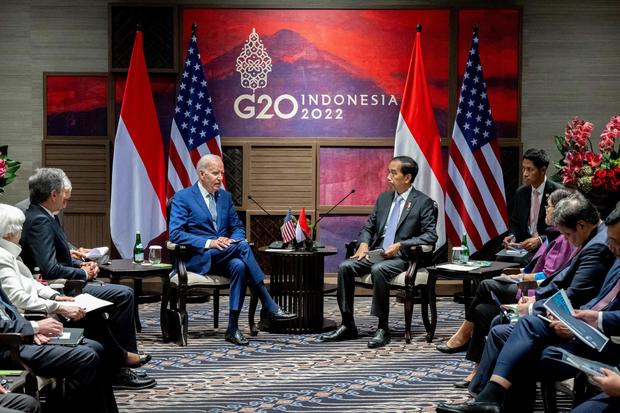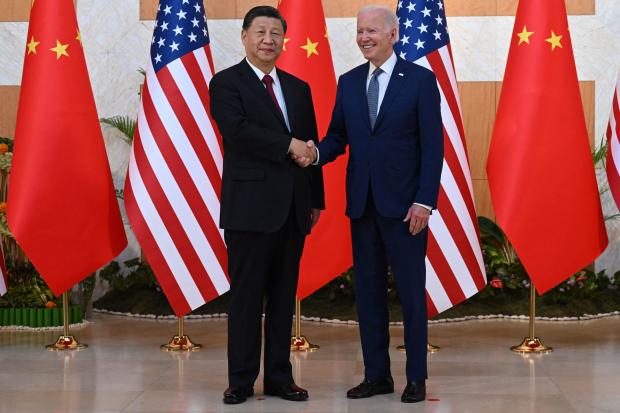President is in Bali, Indonesia, on Monday along with the leaders of many of the world’s biggest economies to attend the two-day G20 summit. The summit, which starts Tuesday, will see presidents and prime ministers wrangle over solutions to a litany of crises from the raging war in Ukraine to tension between the U.S. and China, soaring inflation and hunger, and the threat of a global recession.
As many of the leaders were arriving in Bali fresh from the United Nations’ COP27 climate conference, the rapid warming of the planet will also be a key theme. Below is a quick look at what to know and what to watch for during the summit in Bali.
What is the G20?
The Group of Twenty nations, or “G20,” is an informal organization of countries formed in 1999 to help formulate economic policy. It is made up of the world’s largest and emerging economies, which together account for 80% of global economic output, 75% of world trade, and about 60% of the world’s population. Those nations are Argentina, Australia, Brazil, Canada, China, France, Germany, India, Indonesia, Italy, Japan, South Korea, Mexico, Russia, Saudi Arabia, South Africa, Turkey, the United Kingdom, the United States, and the European Union. Spain is invited as a permanent guest and, this year, Ukraine was also invited to attend.
The annual leadership of the G20 rotates among the members, with Indonesia in the driver’s seat this year and thus hosting the gathering.
President Biden arrived in Indonesia on Sunday night for a three-day stay in the country. The White House said his priorities would include “climate change, the global impact of Putin’s war on Ukraine, including on energy and food security and affordability, and a range of other priorities important to the global economic recovery and building a sustainable and inclusive global economy.”
Mr. Biden met on Monday morning with Indonesian President Joko Widodo and expressed support for Indonesia’s leadership in the Indo-Pacific as the world’s third largest democracy and a strong proponent of the international rules-based order.
The G20’s size leaves more room for internal disagreement than, for instance, the Group of Seven biggest economies. The G20 has among its members some staunch adversaries, which can bring tension and acrimony, but also an opportunity for senior government figures to discuss, and theoretically even resolve, some of the pressing issues fueling conflicts and crises.
Biden and Xi talk “red lines”
One of the most anticipated direct encounters of the week was Mr. Biden’s sit-down meeting on Monday with China’s President Xi Jinping — their first in-person meeting since Mr. Biden came to office. Mr. Biden and Xi shook hands before giving brief remarks to reporters, vowing to “manage” their nations’ differences without resorting to military escalation. Then they headed behind closed doors.
“What I want to do with him when we talk is lay out what each of our red lines are and understand what he believes to be in the critical national interests of China, what I know to be the critical interests of the United States, and to determine whether or not they conflict with one another.”
The issue of Taiwan, and China’s ambition to exert control over the self-governing island, would be on the agenda, the White House confirmed.
“A war over Taiwan is no longer unthinkable, but it is by no means inevitable,” China expert Jessica Chen Weiss wrote in Foreign Affairs, arguing that more deterrence along with more engagement were needed to redefine the rivalry.
Mr. Biden’s meeting with Xi comes just weeks after his administration’s decision to block the export of advanced computer chips from the U.S. to China.
The Russia-Ukraine war
One G20 leader who was to be notably absent from this week’s summit is Russian President Vladimir Putin. More than eight months after Russia launched a full-scale ground invasion of neighboring Ukraine, Putin’s army has been dealt a series of humiliating blows, but commanders on both sides appear to be bracing for a long winter of grinding warfare.
The U.S. and Russia have held back-channel discussions on the crisis and supported a U.N.-brokered deal to keep Russian and Ukrainian grain flowing from ports to ease the global food crisis fueled by the war. But as the leaders gathered in Bali, there was no indication that any real peace talks were about to start.
Russian Foreign Minister Sergey Lavrov, a veteran diplomat, was attending the G20 summit in place of Putin. Ukrainian President Volodymyr Zelenskyy was to address the summit virtually, the Indonesian foreign ministry said, and the Russian embassy in Indonesia did not rule out that Putin might also address the assembly via video link.
“The G20 countries’ positions on the war in Ukraine contrast starkly, yet the conflict raises issues of global concern — economic shocks and nuclear risks — that the leaders cannot pass over in silence,” the nonprofit International Crisis Group wrote in a message to the leaders before the meeting.
Economic recovery and climate change
“The crisis in access to food, energy and finance will be my top priority,” U.N. Secretary-General Antonio Guterres said ahead of the G20 summit, warning that “the COVID-19 pandemic, impacts of the war in Ukraine seen in the rising cost of living and tightening financial conditions and unsustainable debt burdens, along with the escalating climate emergency, are wreaking havoc on economies across the globe.”
The U.N. climate summit, or COP27, continues in Egypt until November 18. Before his bilateral meeting with Xi, Mr. Biden said, “the world expects, I believe, China and the United States to play key roles in addressing global challenges, from climate changes, to food insecurity, and to — for us to be able to work together.”
At COP27, Mr. Biden told delegates that his administration’s actions put the U.S. on track to achieve the goals of the 2015 Paris Agreement by reducing emissions by 2030, and he pledged to continue to provide over $11 billion annually for international climate finance by 2024.
This article was first published in CBS News . All contents and images are copyright to their respective owners and sources.













